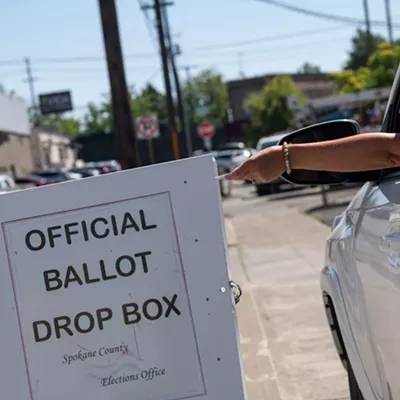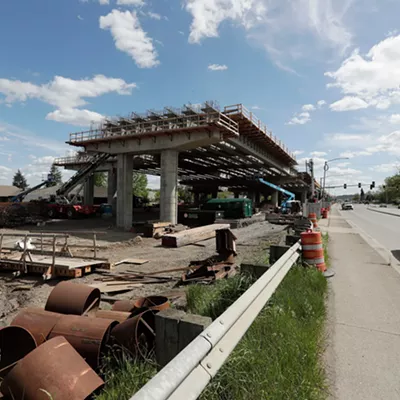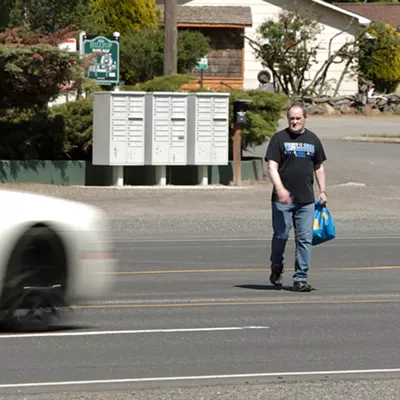Just as President Obama concluded a landmark speech on reforming health care in Chicago on Monday morning, Sen. Maria Cantwell (D-Wash.) stepped into Spokane’s city council chambers for a “listening session” on health care, with doctors and health insurance providers from around the area.
The frustration in the nearly full chamber was palpable throughout the 90-minute session, as Cantwell heard from Providence’s Dr. Andrew Agwunobi and Group Health’s Dr. Bradley Pope, among others, on the state of the broken system. The senator, who has introduced three different health bills in the Senate this month, even drew an outburst of applause when she suggested building a four-year medical school in Spokane.
Afterward, Cantwell sat down with The Inlander to discuss what’s broken, how to fix it and why fewer doctors should become plastic surgeons.
Inlander: You use Washington as a model for effective, efficient health care. What’s working here, and what needs work?
Cantwell: We are a very integrated delivery system, and we focus on delivering quality prevention, wellness, we focus on getting primary care — all these things that really identify what’s wrong with somebody’s health and gets them on a right track for a better outcome. And we’re so efficient at it that Medicare actually pays us less money. What’s wrong about that is that it actually rewards less efficient states in other parts of the country.
We think that’s what’s wrong with the system. If you reward bad delivery systems, and you reward just fee-for-service — that is, the more you order, the more you get paid — you’re not really focusing on what’s good for the patient. And so that’s what’s broken about the system.
So our system is much more focused on the outcome, and we’ve had better outcomes. So, when you look at this and say, jeez, if everybody would deliver care like we do in the Northwest, we’d save billions of dollars nationally. And that would give us the money to do the other things — which is, get more primary care physicians, get a system that covers more people.
So how do you grow the number of primary care docs?
Well, you have to [create incentives for] people to become primary care physicians. The people who are going into medical school now, there’s more incentive to go into specialty care because they’re going to make money. We need to change the formula that basically says you’re going to give more money to primary care physicians.
But we also need to put the dollars on the table for training and education. We need to train more people in primary care, and I think having a four-year institution in Spokane would help [the] whole Inland Northwest educate more physicians.
This was a listening session. So what did you hear in Spokane that interested you?
I was really trying to get at this equation of how to convince my colleagues, who come from these states where there’s more expense. How do you convince them [that what they’re doing is less efficient], as opposed to thinking, ‘Well, we just have sicker people in our state — we have a different population, so they cost more’?
So I was really interested in that cultural issue that Mr. Pope from Group Health brought up. He basically said, ‘We in the Northwest don’t think of the specialty care right away.’ Maybe we are more holistic in our approach. That is what the experts are saying — nationwide — will really help our health care system.
If you start with good primary care — if you go from specialist to specialist, they’re going to miss things about you. They’re not really going to understand. And all they’re going to look at is: ‘Let’s do that heart test’ or ‘Let’s do that brain scan.’ One panel we had back in D.C., they had a patient who went to all these specialists and they ended up missing this eye infection the patient had, because they’re just a brain specialist.
President Obama just spoke on this subject this morning. What did you hear in his speech?
I’m excited. I was a little late getting here because I wanted to hear what he had to say. [Laughs] I thought he did a good job of explaining some of these principles — that you have to reform the system before you build something new. I hope he’s willing to lend support to that effort. I thought he did a good job of talking to the American Medical Association, saying, ‘We want you to do what you do best, which is deliver health care.’ As opposed to having you be the paperwork person. I think he talked a lot about prevention and wellness and reform of the system as a key component.
How does what you’re doing relate to the president’s plans?
I think it’ll dovetail in many areas, but I think where I may differ from some of my colleagues is that I don’t want to support a new system if it doesn’t fix what’s wrong with this one. If you just put more health care on top of this without fixing how inefficient this current system is, then you’re going to have a problem. So I’m for making these changes nationwide. Now. As soon as possible. Start making these incentive changes to incent wellness, to incent primary care, to incent outcome as opposed to volume, and make that kind of change right now. And that’ll give us the cost savings we need to get universal coverage.
Is there a desire in the Senate to tackle this?
I think that there [is]. What I like about what the president said today is: ‘We should do these reforms, no matter what.’ I have said the same thing. We’re getting penalized here in the Northwest. People don’t want to come practice here, because they can go make more money somewhere else. And he brought up that example as well. And he said we have to fix that, no matter what we do to the health care system.
I’m hoping that at a minimum we will pass a health care bill that reforms the existing system. I hope he meant that he would push for that. That would be great for us in the Northwest.




















